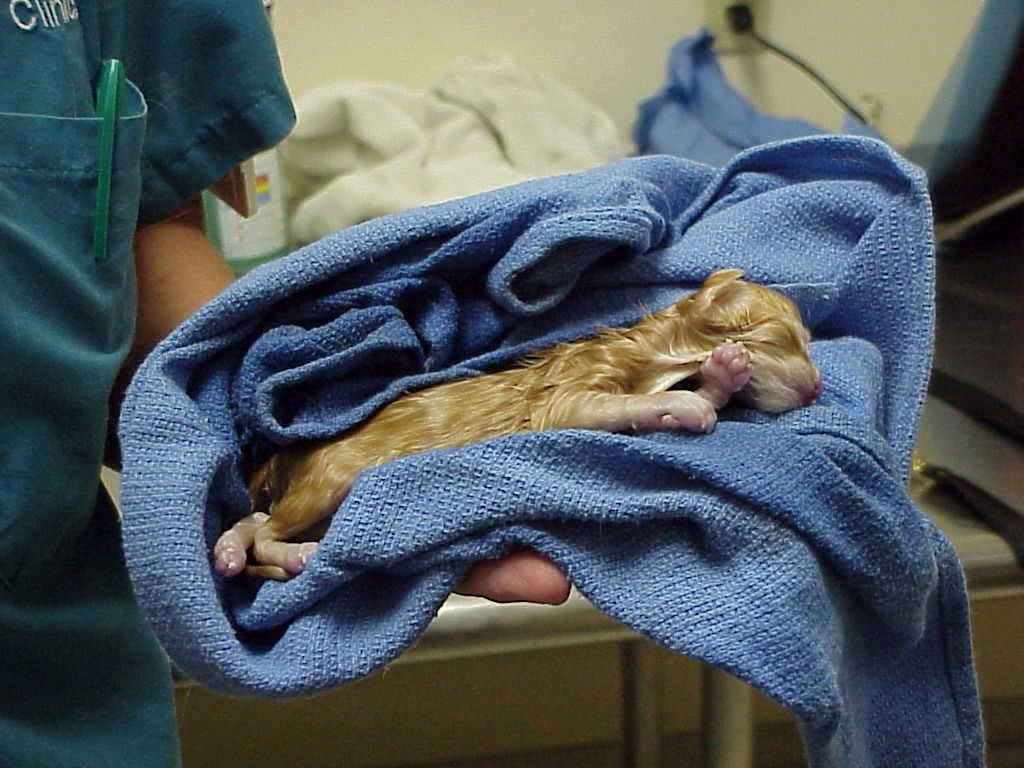Neonate Care
(Newborn puppy or kitten)Proper neonatal care is essential for the proper health and growth of your pets. Once born, newborns have very little fat and energy reserves, and if the environment is not adequate, dehydration, starvation, infection and death can occur rapidly.
Environment: It is recommended that your female be exposed to the whelping area a few days to a few weeks prior to labour. This allows your female to get comfortable and relaxed in her whelping environment and it is less likely that she will try to move the newborn after birth. The area should be clean and free from electrical outlets, hard surfaces where newly born animals can be crushed, or plants. If the area is portable and light, it then makes it easy to clean and dry every few days. A good example is a child’s plastic play pool, which can then be disposed of after 6-8 weeks of use. The area should be kept at a constant temperature range from 32-35°C. A heat lamp above the whelping area is highly recommended. This will allow the center of the area to be slightly warmer then the outer region, and then if the newborns are too warm they can lie on the outer area and be cooler.
Heating pads can cause severe burns to the skin.

Signs of Problems:
• Newborns will not nurse or cannot suckle.
• Newborns try to nurse but do not seem to get enough nutrition.
• They cry excessively.
• Newborns do not gain weight daily or not doubling weight by day 10.
• Newborns are sleeping on top of each other, shivering and moving very slowly.
• Newborns have liquid diarrhoea.
• Milk keeps appearing at nostrils while newborn is suckling and the newborn is not growing well or acting right.
Please contact us immediately if you have any questions or concerns with the proper care and environment of your new pets!
Raising healthy newborns:
New pups and kittens should eat 5-8 times per day, sleep, and have normal stool and urine. Newborns in a comfortable environment should sleep on their sides without signs of shivering or piling on each other for warmth. They all should be nursing contently without out too much crying.
It is recommended that each animal is weighed and identified with a marker (coloured nail polish works well). This will allow you to keep track of the daily weight of your newborns. Newborns should be gaining weight every day. They should double their birth weight in the first 10 days and then double that weight again by day 20.
By day 10-14 your pets’ eyes should be opening up and they should be more mobile. By 21 days, they should be more active and possibly ready to start some sort of other diet, such as ‘puppy rehydratable formula’, introducing slowly as it can change the stool. By day 35-42, pups or kittens should be starting to be weaned onto dry or canned puppy or kitten food. Read about Puppy Care and Kitten Care.
Science Diet® Puppy or Kitten pet food gives your new pet the right balance of essential nutrients to start your pets off right. An ideal combination of tasty ingredients helps a pet’s body grow strong and healthy and it is also great for pregnant and nursing pets.This diet comes in a wet and dry food.
